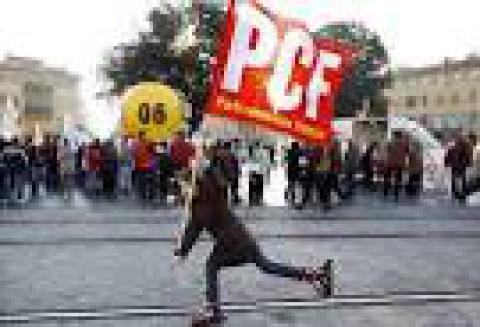“Over 370,000 people are registered at Pôle emploi, the French jobs agency, in the Nord-Pas-de-Calais département. That’s the equivalent of the population of Lille. You’ve got to keep that in mind. The number of unemployed coincides with the number of people who voted for Le Pen.” Bertrand Péricaud, a councilor (PCF) in the regional government, sets the scene as he opens the PCF federal conference in the département, in the town of Douchy-les-Mines.
For the activists today, combating ideological, political and economic confusion is an urgent necessity. Meeting all the inhabitants and workmates is an urgent necessity. And that’s what they’re doing.
“Many are on unemployment. They’re frightened. We have to give them new hope,” Nadine explains. Thus the meeting is also an opportunity to demand “clear proposals” to respond to popular anger, “which can just as easily go red or black,” according to a delegate. Speakers call for not being boxed in by the opponents’ vocabulary and getting away from “words about the cost of labor or competitiveness,” a Roubaix activist interjects irritatedly. “Let’s condemn the cost of unemployment on the individual’s security and health,” another adds. “Unemployment serves to put pressure on those who’ve got a job so that they’ll bow down to the bosses’ demands,” Charles Beauchamp, the vice president (PCF) of the regional general council continues.
Relaunching on-the-job party cells
The cost of labor? Senator Michelle Demessine (PCF) has drafted a parliamentary report that points up the inefficiency of the exonerations from social security contributions, which cost over 20 billion euros, on declining unemployment. The curve of the dividends paid out to shareholders has gone up at the same time that social security contributions have gone down,” she insists. Alain Obadia, an economist and a member of the PCF national leadership, repeats that a national conference will be called in November for the industry of the future, restructured and essential to France.
Hence it is up to the communists to “relaunch company party cells to be as close as possible to the (ideological) struggle,” Alain Bruneel, a regional general councilor, said. And Michel Kopp, an activist, insisted on “clearness”: “My butcher was complaining of the employer’s social security contributions that he has to pay on top of an employee’s wages. I proved to him that he was just paying a part of the wages that he has to pay the worker. There’s an entire job of explanation that has to be redone among the population.”
In the Seine-Saint-Denis département, the question of bringing people together was also at the heart of their federal conference, which was held in Montreuil on October 10 and 11. Where are we in terms of the Left Front? André, from La Courneuve, questioned the assembly on a possible direct joining of the Left Front, “otherwise unity will not be created,” he explained, while Brigitte, and activist in the same city, thinks that the role of the Communist Party is “not to choose a tendency within the Socialist Party,” or to determine who are “the good guys and the bad guys, but to break out of the framework of alternation” and, in her view, “the Left Front was created for that.” “Nor is it a question of choosing between the left and the people, but the people have to construct a left in their image,” she also underlined, implicitly referring to Jean-Luc Mélenchon’s desire to go beyond the framework of the Left Front to address the people directly.
Nathalie Simonet, the new first secretary for the département, proposes “broad unity, with all the men and women who are not resigned” and to whom it is a matter of “proposing a framework to act and to change the status quo.” It is indeed the outline of what might be the left of tomorrow that is the subject of debate, while at the same time each person here thinks that the government is pursuing a free-trade policy “of moral and social regression.”
While Jean-Jacques Karman, a regional general councilor, thinks that it is necessary to “break with that Socialist Party and create an anticapitalist front,” Guy, from the town of Bagnolet, thinks that leaving the Socialist Party as the sole proprietor of the idea of the left would be “giving them a big present.” “The Socialist Party is not the father of the left, the left is 200 years of struggle from the French Revolution to the present day, including the Paris Commune of 1871 and the struggles of 1936,” he said. If, today, the Socialist Party doesn’t put anything forward, then people might think that there aren’t any solutions on the left other than the policy pursued by the government,” he insisted. Everyone agrees on the need to unite, but not everyone draws the same outline of the left.
On the agenda at the PCF conference.
The national conference will bring together nearly 800 delegates in Montreuil. On the agenda: The emergence of a real political alternative and the procedure to bring people together that is necessary to realize that goal. The initiatives and time-frame for the communists will be discussed on Nov. 8. There will be a morning of work on Nov. 9, organized around nine thematic workshops


Spread the word